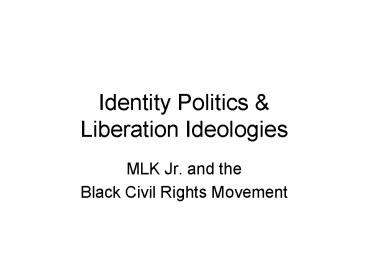Identity Politics - PowerPoint PPT Presentation
1 / 27
Title:
Identity Politics
Description:
Black Civil Rights Movement. Background. Martin Luther King, Jr. (1929-1968) ... For black civil rights leaders, segregation posed difficult questions of ... – PowerPoint PPT presentation
Number of Views:397
Avg rating:3.0/5.0
Title: Identity Politics
1
Identity Politics Liberation Ideologies
- MLK Jr. and the
- Black Civil Rights Movement
2
Background
- Martin Luther King, Jr. (1929-1968)
- Attended and graduated from racially segregated
school high school and colleges in Atlanta - Received doctorate from Boston U in 1955
- Executive Board of NAACP in 1953
- Began pastoral work in Montgomery, Alabama in
1954
3
Background
- Elected leader of the Southern Christian
Leadership Council in 1957 - Led the March on Washington, 1963
4
Background
- In 1964, became the youngest person to win the
Nobel Peace Prize - Assassinated in 1968
5
Overview
- Historical Background to the Civil Rights
Movement - Liberalism and Liberation
- Kings Arguments
6
Civil War Reconstruction
- Union army occupies south
- 14th Amendment (1868)
- 15th Amendment (1870)
- Civil Rights Enforcement Act (1870)
- Civil Rights Act (1872)
- Civil Rights Act (1875)
7
Reconstruction
- First black political leaders elected to Congress
- Hiram Revels (MS) first black senator
- 6 blacks elected to serve in House in 41st and
42nd Congress
8
Reconstruction
- 1876 Presidential Election
- Rutherford B. Hayes (R)
- Samuel Tilden (D)
9
1876 Presidential Election
10
Reconstruction
- In exchange for Hayes winning electoral college
vote, Republicans agree to end occupation of the
South - 1877 Reconstruction essentially ends with end of
occupation - Southern governments and vigilante groups move to
disenfranchise black voters
11
Rise of Segregation
- Voter intimidation (e.g., KKK activity)
- Change voting requirements
- poll tax, literacy test, white primaries,
grandfather clause - Civil Rights cases (1883)
- Supreme Court invalidates the 1875 Civil Rights
Act - Plessy vs Ferguson (1896)
12
Plessy vs Ferguson
- The object of the Fourteenth Amendment was
undoubtedly to enforce the absolute equality of
the two races before the law, but in the nature
of things it could not have been intended to
abolish distinctions based upon color, or to
enforce social, as distinguished from political,
equality, or a commingling of the two races upon
terms unsatisfactory to either. -- Justice
Henry Billings Brown
Homer Plessy
13
Plessy v. Ferguson
- "We consider the underlying fallacy of the
plaintiff's argument to consist in the assumption
that the enforced separation of the two races
stamps the colored race with a badge of
inferiority. If this be so, it is not by reason
of anything found in the act, but solely because
the colored race chooses to put that construction
upon it.
Justice Henry Billings Brown
14
Jim Crow
15
Jim Crow
Jim Crow statutes by state
16
Jim Crow
- For black civil rights leaders, segregation posed
difficult questions of strategy and how to combat
legal (de jure) inequality
17
Response to Segregation
- Booker T. Washington and Accomodationism
- Take whatever opportunities white America
provides and do best you can until conditions
change
18
Response to Segregation
- W.E.B. Dubois and the founding of the NAACP
- Legal strategy of challenging of separate but
equal provision
19
Separate, but Equal?
Classroom in black school Seat Pleasant, Maryland
20
Separate, but Equal?
Black school, Camden, MS
21
Separate, but Equal?
Black school, Louisa County, VA
22
Response to Segregation
- Key desegregation cases
- Missouri ex rel. Gaines v. Canada (1938)
- Sweatt v. Painter (1950)
23
Response to Segregation
- McLaurin v. Oklahoma State Regents for Higher
Education (1950)
24
Response to Segregation
- 1954 Brown vs. Board of Education of Topeka, KN
25
Modern Civil Rights
- Emergence of Modern Civil Rights Movement
26
Modern Civil Rights
- In wake of Brown v. Board of Education,
combination of further legal challenges,
political mobilization, civil disobedience
(peaceful and other)
27
Liberalism Revisited
- Liberalism focuses on the primacy of the
individual - The liberation and identity movements we will be
examining make two types of claims - Some groups have been treated as individuals
legally, and thats neither fair nor just - Because of this historical treatment, government
policy should be used to advance the collective
group well being































